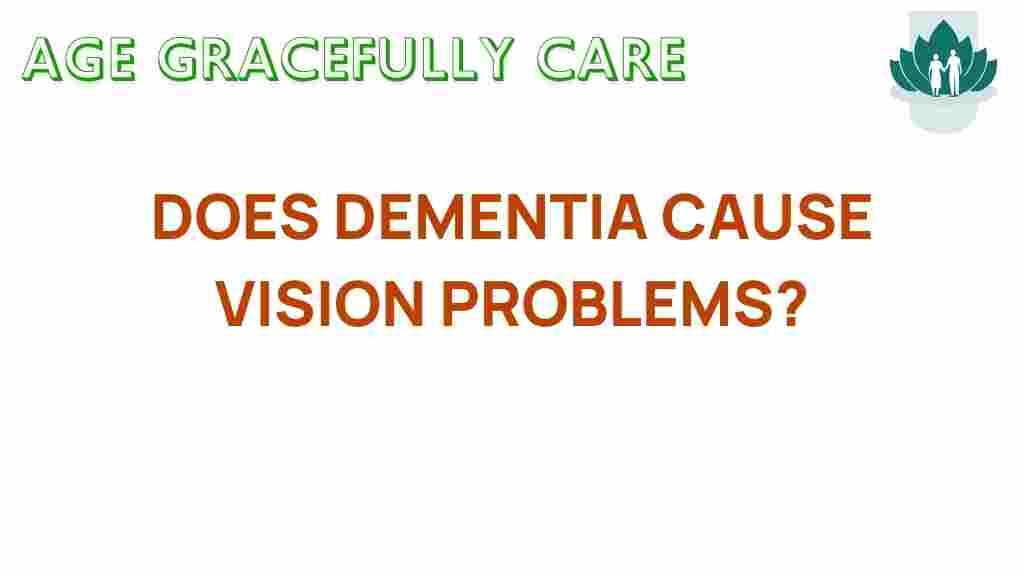Unraveling the Connection: Does Dementia Cause Vision Problems?
Dementia is a complex syndrome that affects millions of people worldwide. It is primarily known for its impact on cognitive decline, but what many may not realize is that dementia can also lead to significant vision problems. In this article, we will explore the intricate connection between dementia and vision health, focusing on how neurological disorders influence perception and eye health. We will also discuss various forms of dementia, including Alzheimer’s, and how they can affect an individual’s ability to see and interpret visual information.
Understanding Dementia and Its Types
Dementia encompasses a range of neurological disorders characterized by a decline in cognitive abilities, affecting memory, thinking, and social skills. The most common form of dementia is Alzheimer’s disease, which accounts for 60-80% of all dementia cases. Other types include:
- Vascular dementia
- Lewy body dementia
- Frontotemporal dementia
- Mixed dementia
Each type of dementia has its unique symptoms and progression patterns. However, one commonality among these disorders is their potential impact on vision and perception.
The Link Between Dementia and Vision Problems
Research indicates that individuals with dementia may experience various vision problems, which can complicate their overall healthcare management. This connection between dementia and vision problems can be attributed to several factors:
- Cognitive Decline: As cognitive abilities deteriorate, so does the ability to process visual information effectively.
- Neurological Changes: Dementia causes changes in the brain that can disrupt the pathways responsible for visual processing.
- Eye Health Deterioration: Aging often leads to eye health issues, which can be exacerbated by the presence of dementia.
Cognitive Decline and Its Impact on Vision
The relationship between cognitive decline and vision problems is significant. Individuals with dementia may struggle with:
- Visual Agnosia: Difficulty recognizing objects, faces, or places, despite having intact vision.
- Depth Perception Issues: Challenges in judging distances may increase the risk of falls.
- Contrast Sensitivity: Reduced ability to distinguish between different shades, making it harder to see in low-light conditions.
These issues can stem from the brain’s inability to interpret visual stimuli correctly, which can result in confusion and frustration for both the individual and their caregivers.
How Alzheimer’s Affects Vision
Alzheimer’s disease, as the most prevalent form of dementia, has specific implications for visual health. Research shows that individuals with Alzheimer’s may experience:
- Visual Hallucinations: Misinterpretation of visual stimuli can lead to seeing things that aren’t there.
- Difficulty with Visual-Spatial Skills: This can affect navigation and mobility, increasing the risk of accidents.
- Changes in Color Perception: Altered perception of colors can lead to confusion in differentiating objects.
Understanding these changes is critical for caregivers and healthcare providers to offer appropriate support and interventions.
Age-Related Eye Health Issues
Aging is an inevitable part of life, and it significantly impacts eye health. Common age-related eye conditions that can compound the effects of dementia include:
- Cataracts: Clouding of the lens that can cause blurry vision.
- Macular Degeneration: Affects central vision and can lead to visual distortion.
- Glaucoma: Increased pressure in the eye can damage the optic nerve.
- Diabetic Retinopathy: Damage to the blood vessels in the retina due to diabetes.
These conditions can exacerbate the vision problems already present due to cognitive decline, making it essential for individuals with dementia to have regular eye exams.
Step-by-Step Process for Managing Vision Problems in Dementia Patients
Addressing vision problems in patients with dementia requires a comprehensive approach. Here are steps to consider:
- Regular Eye Exams: Schedule yearly eye exams to detect any changes in vision or eye health.
- Consult with Specialists: Engage with ophthalmologists or optometrists who are experienced in treating older adults and those with cognitive impairments.
- Ensure Safe Environments: Modify living spaces to enhance safety, such as improving lighting and reducing clutter.
- Utilize Assistive Technologies: Consider tools like magnifying glasses or voice-activated devices to assist with daily tasks.
- Monitor Medication Side Effects: Keep track of any medications that may affect vision and consult healthcare providers for alternatives.
Troubleshooting Tips for Caregivers
As a caregiver, it can be challenging to manage the vision problems that accompany dementia. Here are some troubleshooting tips:
- Maintain Consistency: Use the same layout and arrangement of furniture to help the individual orient themselves.
- Improve Lighting: Ensure that living spaces are well-lit to reduce shadows and improve visibility.
- Use High-Contrast Colors: Employ contrasting colors for important objects to enhance visibility.
- Encourage Eye Health: Promote a diet rich in vitamins and nutrients that support eye health, such as leafy greens and fish.
Utilizing these strategies can significantly improve the quality of life for individuals with dementia and their caregivers.
Conclusion: The Importance of Eye Health in Dementia Care
The connection between dementia and vision problems is profound and multifaceted. Understanding how cognitive decline impacts eye health is crucial for developing effective care strategies. By addressing vision issues, caregivers can enhance the overall well-being of individuals with dementia, facilitating better communication and engagement.
Regular eye check-ups, appropriate interventions, and environmental adjustments can make a tremendous difference in the lives of those affected. As we continue to unravel the complexities of dementia and its effects on health, it is essential to prioritize both cognitive and visual health for a more holistic approach to care. For more information on dementia and healthcare resources, visit this link.
For an in-depth understanding of age-related eye conditions, consider reading more at this resource.
This article is in the category Health and created by AgeGracefullyCare Team
